外研版九年级下册Module 8 My future life Unit 2课件(共45张PPT)
文档属性
| 名称 | 外研版九年级下册Module 8 My future life Unit 2课件(共45张PPT) | 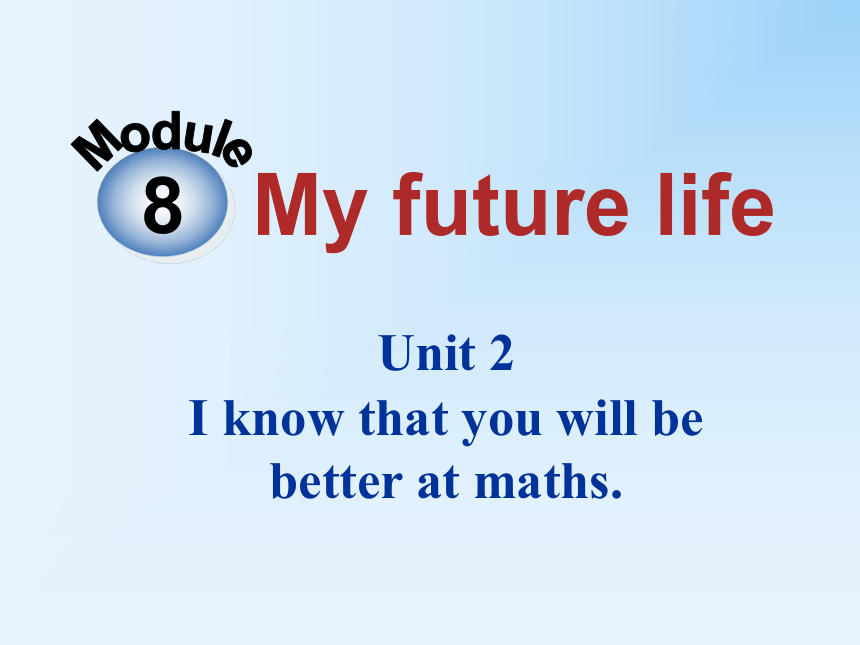 | |
| 格式 | ppt | ||
| 文件大小 | 1.9MB | ||
| 资源类型 | 教案 | ||
| 版本资源 | 外研版 | ||
| 科目 | 英语 | ||
| 更新时间 | 2022-08-20 21:16:50 | ||
图片预览


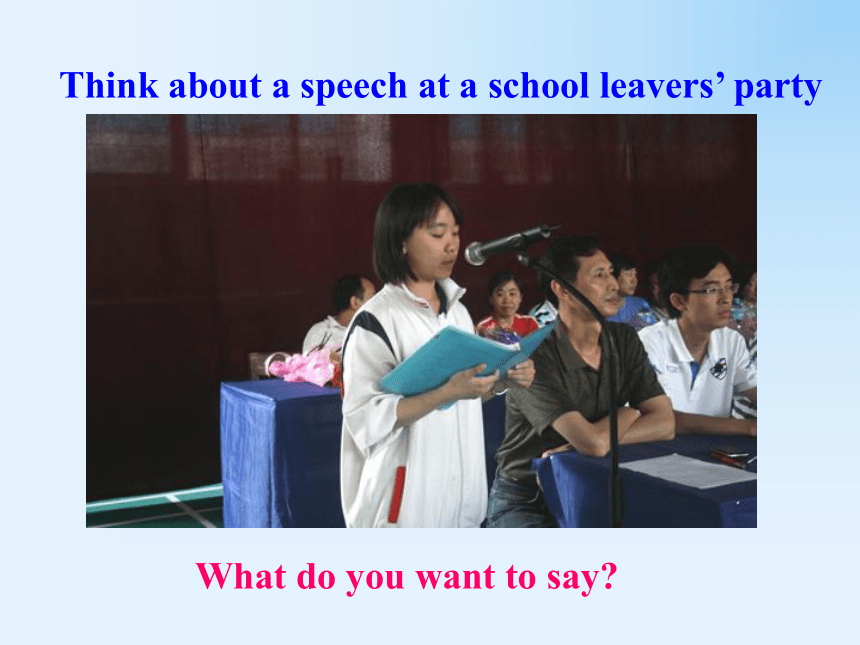


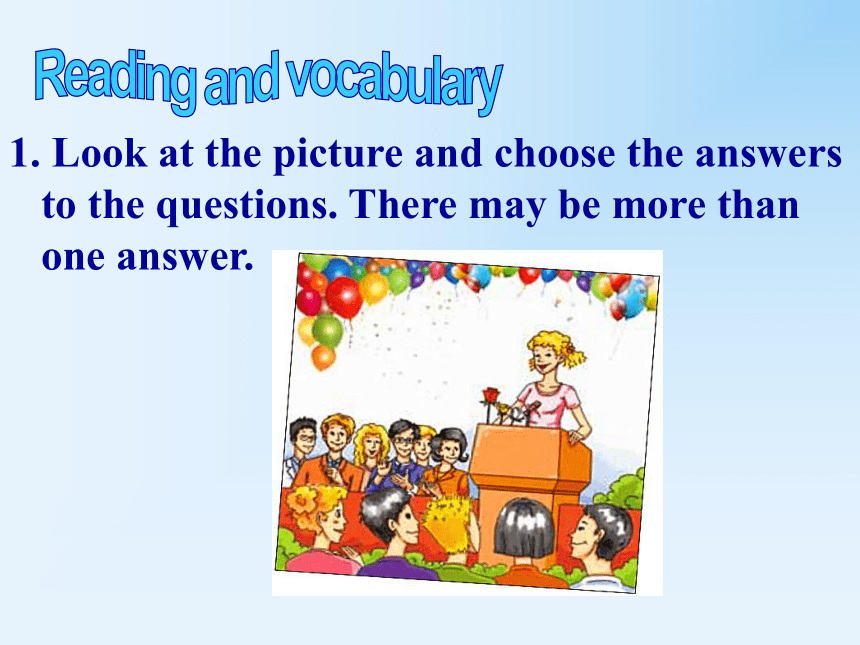
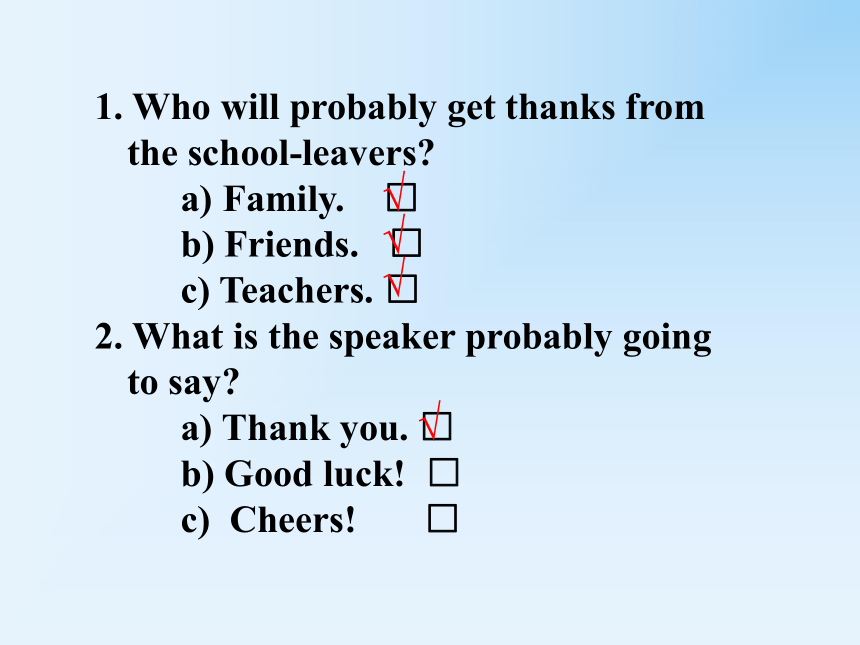




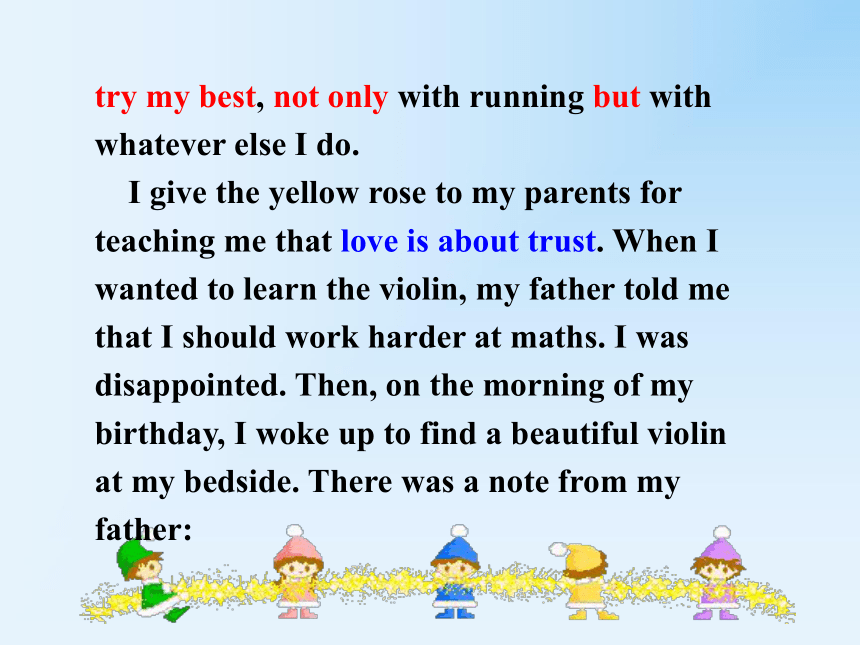
文档简介
(共45张PPT)
8
Unit 2
I know that you will be
better at maths.
What do you want to say
Think about a speech at a school leavers’ party
Who are likely to be thanked
There is something you must do before graduating.
Go and bid farewell to each of your classmates,
because maybe it is the last time you can see them
face to face.
Leave your address and telephone number to all your
friends.
Take photos with your classmates and your best
friend, it is a kind of memory which can last forever.
Take photos with the campus which you live with for
three years , but remember to put on your biggest
smile you ever have.
Say sorry to your friend whom you never have the
courage to apologize to.
Look at the picture and choose the answers to the questions. There may be more than one answer.
1. Who will probably get thanks from the school-leavers
Family. □
b) Friends. □
c) Teachers. □
2. What is the speaker probably going to say
Thank you. □
b) Good luck! □
c) Cheers! □
√
√
√
√
Now read the passage and check.
Dear head teacher, teachers, parents and fellow students, I’m very proud that you have chosen me to speak to you today.
I have three roses here: a red one, a yellow one and a white one. These roses are to thank three groups of people for the three most important things that I have learnt. These three things are friendship, effort and trust.
I give the red rose to my friends. When I started school here, my Chinese was not good, and some of my mistakes were very funny. I once tried to say “xiexie”, but I said “xiaxia” instead. Of course some people laughed, and I felt quite silly. But they were not laughing at me. They taught me to say many things in Chinese and kindly invited me to join them. Today, thanks to their kindness, my Chinese is much better, and we have become friends. So, let me
say “xiexie” again to all of you for your help.
I give the white rose to my teachers, who have taught me that there is no success without effort. When I started running in the 800 metres, I always finished last and I just wanted to give up. But the PE teacher, Ms Huang, helped me. She ran along with me, and she said, “You only really lose if you give up!” I still can’t run fast enough, but I’ve learnt to
try my best, not only with running but with whatever else I do.
I give the yellow rose to my parents for
teaching me that love is about trust. When I wanted to learn the violin, my father told me that I should work harder at maths. I was disappointed. Then, on the morning of my birthday, I woke up to find a beautiful violin at my bedside. There was a note from my father:
“I’m sure you will be good at music. I know that you will be better at maths.” I’m sure that you all have your own memories about the happiness of the last three years, and the people whom you want to thank for it, so let’s all stand up and say, “Thank you, friends, teachers and parents! We love you!”
2. Find sentences which show:
the three things the speaker has learnt
These three things are friendship, effort and trust.
2. the three groups of people the speaker wants to thank
I give the red rose to my friends.
I give the white rose to my teachers...
I give the yellow rose to my parents ...
3. what the speaker has learnt from each group of people
But they were not laughing at me. They taught me to say many things in Chinese and kindly invited me to join them.
I give the white rose to my teachers, who have taught me that there is no success without effort.
I give the yellow rose to my parents for
teaching me that love is about trust.
3. Answer the questions.
Which sentence in Paragraph 4 means “You
have to work hard to succeed”
There is no success without effort.
2. “You only really lose if you give up!” What does the sentence mean
If you stop trying, you can never succeed.
3. “I’m sure you will be good at music. I know
that you will be better at maths.” What did
Betty’s father want her to do
Her father wanted her to work harder at
maths and enjoy music.
4. How do you think Betty would write to her
father in reply
She would write and say thank you for the
violin and the advice.
5. “I’m sure that you all have your own
memories about the happiness of the last
three years, and the people whom you want
to thank for it...” What does it mean
It refers to the happiness of the last three
years.
4. Check (√) the answers to the questions.
There may be more than one answer.
Which words can you use to describe the
speech in Activity 1
careful □ excited □ moving □ polite □
silly □ troubled □ warm □ worried □
2. Which sentence(s) will you probably find in speeches at a school-leavers’ party
a) Thank you, friends, teachers and parents! □
b) We’ll always stay in touch. □
c) I’m proud to be chosen to speak to you. □
d) Let’s all stand up and say… □
√
√
√
√
√
√
√
Language points
1. I’m very proud that you have chosen me to
speak to you today.
今天你们选择让我演讲,这让我感到很骄傲。
be proud that 后接从句
be proud of
take pride in
为……感到骄傲/自豪
后接让人引以为荣的对象, 为名词、动词-ing形式
The young mother was proud that her son
succeeded.
The young mother took pride in her son’s success.
= The young mother was proud of her son’s success.
这位年轻的妈妈为他儿子的成功感到骄傲。
2. These roses are to thank three groups of people for the three most important things that I have learnt.
这些玫瑰用来表达对三组人的谢意,因为我从他们(那里)学到了最重要的三件事。
thank sb. for sth / doing sth 为……感谢……
They thanked their parents for bringing them up.
他们感谢父母将自己养大。
thanks to 为介词词组,意思是“多亏;由于;因为(含义相当于because of)
Thanks to your help, we were successful.
由于你的帮助, 我们得以成功。
3. I once tried to say “xiexie”, but I said
“xiaxia” instead.
我曾经想说“谢谢”,反而却说成了“夏夏”。
instead “反而,反倒” 单独使用的时候是副词,常用于句末。
We’ve no coffee. Would you like tea instead?
我没有咖啡了,喝茶行吗?
It will take days by car, so let’s fly instead.
坐汽车得好几天时间,所以我们还是改乘飞机
吧。
4. Of course some people laughed, and I felt quite
silly.
当然有些人笑了,我也觉得很傻。
辨析:silly, foolish与stupid 这3个词都有“蠢”
的含义:
silly 是一个无伤大雅,甚至显得童稚可爱的词汇,如父母可以说孩子silly,但没有一个父母会认为自己的孩子 foolish 或stupid。
foolish 语气次之,通常形容由于缺乏常识,判断能力有限而做出不恰当的决定。反义词wise。
stupid 语气最强。一般指某人缺乏正常的理解力,智力上有天生的缺陷,所以这是一个贬义词。
You silly child. 你这个傻孩子。(并无贬意)
Stay hungry, stay foolish!
求知若渴,虚心若愚。——乔布斯
It is foolish of her to spend so much money on
her shoes.
她花这么多钱在她的鞋子上真是太傻了。
Don’ t ask so many silly questions. She is a bit
foolish but not stupid.
别再问这样傻的问题了!她是有点犯傻但
不是天生愚钝。
5. I give the white rose to my teachers, who have
taught me that there is no success without effort.
我将白玫瑰献给我的老师们,他们教我(明
白了)不努力就不会成功(的道理)。
① who have taught me that there is no success without effort 是一个非限定性定语从句,对前面的先行词teachers进行信息的补充,而不是限定性描述。与限定性定语从句不同, 非限定性定语从句前面通常加逗号,从句部分即使被省略也不会造成主句意义上的不完整。非限定性定语从句中的关系代词不能省略。
② 这个非限定性定语从句中还包含一个宾语
从句that there is no success without effort,
作 have taught 的宾语。
③ no/not…without…表示“没有......就不......”。
例如:
We cannot achieve anything without you.
没有你我们将一事无成。
He is not leaving without you.
没有你他不会离开(他对你不离不弃)。
6. She ran along with me, and she said, “You
only really lose if you give up!”
她和我一起跑,而且她说:“如果你放弃,(那么)你才真的失败了。
这句话要表达的是:只要你坚持下去,跑完全程,那么就算你最后一个到达终点,你也不是一个失败者。
① along with是介词短语,意为“连同……一
起;伴随着”,与together with 同义。
The students planted trees along with their
teachers.
学生们和老师一起植树了。
② give up 意为“放弃”,后接名词、代词或动词-ing形式。后接代词作宾语时,须将代词置于give和up之间。
You should give up smoking. It is bad for
your health.
你应该戒烟,吸烟有害你的身体健康。
There is no help for it but give it up.
除放弃之外毫无它法.
7. I still can’t run fast enough, but I’ve learnt to
try my best, not only with running but with
whatever else I do.
我仍然跑得不够快,但是我学会了尽我最大的
努力, 不仅是跑步而且包括所有我做的事情。
① A. enough 作副词,意为“足够地;十分地”,
修饰形容词、副词时需放在其后。
It is warm enough in the room.
房间里够暖和了。
B. adj. + enough + (for sb.) to do sth.
足够……能做某事
I was old enough to work and earn money.
我已经长大了,可以工作赚钱了。
C. enough作形容词, 意为“充足的; 足够的”,可作表语也可作定语,即enough作为形容词修饰名词时,可放在其前,也可放在其后。
There aren't enough tents to shelter them all.
没有足够的帐篷供他们容身。
There’ll be time enough to relax when you’ve
finished your work.
当你完成工作,仍有足够的时间放松。
② not only ... but (also) ...意为不 但……而
且 ……”,在应用时要遵循以下三个原则:
A. 并列原则:not only ... but also ...并列连
词,连接两个并列成分,其中also可省略。
B.主谓一致原则:not only…but also…连接
两个并列主语时,谓语动词在人称和数上要与but also后的主语保持一致。
C. 倒装原则:not only…but also ...连接两个并列分句时,not only 置于句首,表示强调,其引导的句子要用部分倒装,即将谓语动词的一部分(如情态动词、助动词等)放在主语的前面,而but also 的句子用正常语序。
He not only studies hard but also works well.
他不仅学习努力,而且认真工作。(并列原则)
Not only he but also I am interested in pop
music. (主谓一致原则)
不仅是他而且我也对流行音乐感兴趣。
Not only did he make a promise, but also he
kept it. (倒装原则)
他不仅做出了许诺,而且履行了诺言。
8. “I’m sure you will be good at music. I know
that you will be better at maths.”
“我相信你将会很擅长音乐,我也知道你将会
更精通数学。”
be good at 意为“擅长”,后接名词、代词或动
词-ing形式,同义短语 do well in意为“在……方面做得好”。
be better at 为be good at 的比较级。
He is good at swimming.
= He does well in swimming.
他擅长游泳。
You may have to make speeches on the first day at your senior high. Try to plan ahead what you are going to say, but do not write the speech in full — just make
notes. When you make your speech using the notes, you will sound much more natural.
5. Write a speech you might give at your
school-leavers’ party.
Start your speech by saying what your speech
is going to be about.
Dear head teacher, teachers and parents, I’d
like to thank you for…
Decide who you want to say thank you to.
There are many people who I’d like to thank.
First, I want to thank…
Decide what you want to thank them for with examples.
They have always given me great help…
Finish your speech by giving best wishes
for the future.
Thank you and good luck for the future.
My speech at the school leavers’ party
Teachers and classmates, I’m Li Ming from Class1, Grade 9. I’m a bit nervous but very proud to speak at the school leavers’ party.
First, I’d like to thank all our teachers. We have learned a lot from you. You show us your kindness. Your patience and rich knowledge. You’ve developed our interests ,skills and made us grow up happily. You’ll always be our role models.
Example
Next, I should thank my classmates. We have become good friends. We’ve studied together, helped each other and had a lot of fun. Soon we will go to new schools and we may not see each other so often in the future. But I believe our friendship will last forever.
Wish you all success and good luck in the future.
Last but not least, I should thank my parents for the love they have shown me.
That’s all. Thank you.
Ⅰ. 单项选择。
— Mom, I was the first to reach the top of the
mountain.
— Good job, Jack! I’m ____ of you.
A. careful B. proud
C. tired D. afraid
B
2. It was a difficult time for the quake-hit
victims in Ya’an, but they didn’t ____ hope.
A. give up B. give off
C. give in D. give out
3. Math is difficult for him, so he wants to ____.
A. go on B. give up it
C. give back D. give it up
A
D
4. The traffic was held up for more than thirty
minutes,_____ caused me to arrive late.
A. it B. that C. what D. which
5. Not only my friends but also I ___ interested in football and Messi is our favorite star.
A. be B. am C. is D. are
6. Now ____ the young ___ the old are learning
to speak English.
A. only; except B. either; or
C. neither; nor D. not only; but also
D
B
D
1. He didn’t give John the money, but he gave it to me instead. (同义句转换)
_______ ___ giving John the money, he gave it to me.
2. 我们班同学都为李老师骄傲。
My classmates _________________________ Mr. Li.
Instead of
are proud of /take pride in
II. 完成句子。
3. 没有水鱼就无法生存。
The fish ____ ____ live _______ water.
4. 尽管我学习不好,但我从未放弃过。
______________________________ I didn’t do well in my lessons, I never_____ ___.
5. 我画画得好,歌唱得更好。
I ___ _____ ___ painting and I ___ ______ ___ singing.
can not
without
Though / Although / Even though
gave up
am good at
am better at
Homework
Write a passage for your speech
at the school leavers’ party.
8
Unit 2
I know that you will be
better at maths.
What do you want to say
Think about a speech at a school leavers’ party
Who are likely to be thanked
There is something you must do before graduating.
Go and bid farewell to each of your classmates,
because maybe it is the last time you can see them
face to face.
Leave your address and telephone number to all your
friends.
Take photos with your classmates and your best
friend, it is a kind of memory which can last forever.
Take photos with the campus which you live with for
three years , but remember to put on your biggest
smile you ever have.
Say sorry to your friend whom you never have the
courage to apologize to.
Look at the picture and choose the answers to the questions. There may be more than one answer.
1. Who will probably get thanks from the school-leavers
Family. □
b) Friends. □
c) Teachers. □
2. What is the speaker probably going to say
Thank you. □
b) Good luck! □
c) Cheers! □
√
√
√
√
Now read the passage and check.
Dear head teacher, teachers, parents and fellow students, I’m very proud that you have chosen me to speak to you today.
I have three roses here: a red one, a yellow one and a white one. These roses are to thank three groups of people for the three most important things that I have learnt. These three things are friendship, effort and trust.
I give the red rose to my friends. When I started school here, my Chinese was not good, and some of my mistakes were very funny. I once tried to say “xiexie”, but I said “xiaxia” instead. Of course some people laughed, and I felt quite silly. But they were not laughing at me. They taught me to say many things in Chinese and kindly invited me to join them. Today, thanks to their kindness, my Chinese is much better, and we have become friends. So, let me
say “xiexie” again to all of you for your help.
I give the white rose to my teachers, who have taught me that there is no success without effort. When I started running in the 800 metres, I always finished last and I just wanted to give up. But the PE teacher, Ms Huang, helped me. She ran along with me, and she said, “You only really lose if you give up!” I still can’t run fast enough, but I’ve learnt to
try my best, not only with running but with whatever else I do.
I give the yellow rose to my parents for
teaching me that love is about trust. When I wanted to learn the violin, my father told me that I should work harder at maths. I was disappointed. Then, on the morning of my birthday, I woke up to find a beautiful violin at my bedside. There was a note from my father:
“I’m sure you will be good at music. I know that you will be better at maths.” I’m sure that you all have your own memories about the happiness of the last three years, and the people whom you want to thank for it, so let’s all stand up and say, “Thank you, friends, teachers and parents! We love you!”
2. Find sentences which show:
the three things the speaker has learnt
These three things are friendship, effort and trust.
2. the three groups of people the speaker wants to thank
I give the red rose to my friends.
I give the white rose to my teachers...
I give the yellow rose to my parents ...
3. what the speaker has learnt from each group of people
But they were not laughing at me. They taught me to say many things in Chinese and kindly invited me to join them.
I give the white rose to my teachers, who have taught me that there is no success without effort.
I give the yellow rose to my parents for
teaching me that love is about trust.
3. Answer the questions.
Which sentence in Paragraph 4 means “You
have to work hard to succeed”
There is no success without effort.
2. “You only really lose if you give up!” What does the sentence mean
If you stop trying, you can never succeed.
3. “I’m sure you will be good at music. I know
that you will be better at maths.” What did
Betty’s father want her to do
Her father wanted her to work harder at
maths and enjoy music.
4. How do you think Betty would write to her
father in reply
She would write and say thank you for the
violin and the advice.
5. “I’m sure that you all have your own
memories about the happiness of the last
three years, and the people whom you want
to thank for it...” What does it mean
It refers to the happiness of the last three
years.
4. Check (√) the answers to the questions.
There may be more than one answer.
Which words can you use to describe the
speech in Activity 1
careful □ excited □ moving □ polite □
silly □ troubled □ warm □ worried □
2. Which sentence(s) will you probably find in speeches at a school-leavers’ party
a) Thank you, friends, teachers and parents! □
b) We’ll always stay in touch. □
c) I’m proud to be chosen to speak to you. □
d) Let’s all stand up and say… □
√
√
√
√
√
√
√
Language points
1. I’m very proud that you have chosen me to
speak to you today.
今天你们选择让我演讲,这让我感到很骄傲。
be proud that 后接从句
be proud of
take pride in
为……感到骄傲/自豪
后接让人引以为荣的对象, 为名词、动词-ing形式
The young mother was proud that her son
succeeded.
The young mother took pride in her son’s success.
= The young mother was proud of her son’s success.
这位年轻的妈妈为他儿子的成功感到骄傲。
2. These roses are to thank three groups of people for the three most important things that I have learnt.
这些玫瑰用来表达对三组人的谢意,因为我从他们(那里)学到了最重要的三件事。
thank sb. for sth / doing sth 为……感谢……
They thanked their parents for bringing them up.
他们感谢父母将自己养大。
thanks to 为介词词组,意思是“多亏;由于;因为(含义相当于because of)
Thanks to your help, we were successful.
由于你的帮助, 我们得以成功。
3. I once tried to say “xiexie”, but I said
“xiaxia” instead.
我曾经想说“谢谢”,反而却说成了“夏夏”。
instead “反而,反倒” 单独使用的时候是副词,常用于句末。
We’ve no coffee. Would you like tea instead?
我没有咖啡了,喝茶行吗?
It will take days by car, so let’s fly instead.
坐汽车得好几天时间,所以我们还是改乘飞机
吧。
4. Of course some people laughed, and I felt quite
silly.
当然有些人笑了,我也觉得很傻。
辨析:silly, foolish与stupid 这3个词都有“蠢”
的含义:
silly 是一个无伤大雅,甚至显得童稚可爱的词汇,如父母可以说孩子silly,但没有一个父母会认为自己的孩子 foolish 或stupid。
foolish 语气次之,通常形容由于缺乏常识,判断能力有限而做出不恰当的决定。反义词wise。
stupid 语气最强。一般指某人缺乏正常的理解力,智力上有天生的缺陷,所以这是一个贬义词。
You silly child. 你这个傻孩子。(并无贬意)
Stay hungry, stay foolish!
求知若渴,虚心若愚。——乔布斯
It is foolish of her to spend so much money on
her shoes.
她花这么多钱在她的鞋子上真是太傻了。
Don’ t ask so many silly questions. She is a bit
foolish but not stupid.
别再问这样傻的问题了!她是有点犯傻但
不是天生愚钝。
5. I give the white rose to my teachers, who have
taught me that there is no success without effort.
我将白玫瑰献给我的老师们,他们教我(明
白了)不努力就不会成功(的道理)。
① who have taught me that there is no success without effort 是一个非限定性定语从句,对前面的先行词teachers进行信息的补充,而不是限定性描述。与限定性定语从句不同, 非限定性定语从句前面通常加逗号,从句部分即使被省略也不会造成主句意义上的不完整。非限定性定语从句中的关系代词不能省略。
② 这个非限定性定语从句中还包含一个宾语
从句that there is no success without effort,
作 have taught 的宾语。
③ no/not…without…表示“没有......就不......”。
例如:
We cannot achieve anything without you.
没有你我们将一事无成。
He is not leaving without you.
没有你他不会离开(他对你不离不弃)。
6. She ran along with me, and she said, “You
only really lose if you give up!”
她和我一起跑,而且她说:“如果你放弃,(那么)你才真的失败了。
这句话要表达的是:只要你坚持下去,跑完全程,那么就算你最后一个到达终点,你也不是一个失败者。
① along with是介词短语,意为“连同……一
起;伴随着”,与together with 同义。
The students planted trees along with their
teachers.
学生们和老师一起植树了。
② give up 意为“放弃”,后接名词、代词或动词-ing形式。后接代词作宾语时,须将代词置于give和up之间。
You should give up smoking. It is bad for
your health.
你应该戒烟,吸烟有害你的身体健康。
There is no help for it but give it up.
除放弃之外毫无它法.
7. I still can’t run fast enough, but I’ve learnt to
try my best, not only with running but with
whatever else I do.
我仍然跑得不够快,但是我学会了尽我最大的
努力, 不仅是跑步而且包括所有我做的事情。
① A. enough 作副词,意为“足够地;十分地”,
修饰形容词、副词时需放在其后。
It is warm enough in the room.
房间里够暖和了。
B. adj. + enough + (for sb.) to do sth.
足够……能做某事
I was old enough to work and earn money.
我已经长大了,可以工作赚钱了。
C. enough作形容词, 意为“充足的; 足够的”,可作表语也可作定语,即enough作为形容词修饰名词时,可放在其前,也可放在其后。
There aren't enough tents to shelter them all.
没有足够的帐篷供他们容身。
There’ll be time enough to relax when you’ve
finished your work.
当你完成工作,仍有足够的时间放松。
② not only ... but (also) ...意为不 但……而
且 ……”,在应用时要遵循以下三个原则:
A. 并列原则:not only ... but also ...并列连
词,连接两个并列成分,其中also可省略。
B.主谓一致原则:not only…but also…连接
两个并列主语时,谓语动词在人称和数上要与but also后的主语保持一致。
C. 倒装原则:not only…but also ...连接两个并列分句时,not only 置于句首,表示强调,其引导的句子要用部分倒装,即将谓语动词的一部分(如情态动词、助动词等)放在主语的前面,而but also 的句子用正常语序。
He not only studies hard but also works well.
他不仅学习努力,而且认真工作。(并列原则)
Not only he but also I am interested in pop
music. (主谓一致原则)
不仅是他而且我也对流行音乐感兴趣。
Not only did he make a promise, but also he
kept it. (倒装原则)
他不仅做出了许诺,而且履行了诺言。
8. “I’m sure you will be good at music. I know
that you will be better at maths.”
“我相信你将会很擅长音乐,我也知道你将会
更精通数学。”
be good at 意为“擅长”,后接名词、代词或动
词-ing形式,同义短语 do well in意为“在……方面做得好”。
be better at 为be good at 的比较级。
He is good at swimming.
= He does well in swimming.
他擅长游泳。
You may have to make speeches on the first day at your senior high. Try to plan ahead what you are going to say, but do not write the speech in full — just make
notes. When you make your speech using the notes, you will sound much more natural.
5. Write a speech you might give at your
school-leavers’ party.
Start your speech by saying what your speech
is going to be about.
Dear head teacher, teachers and parents, I’d
like to thank you for…
Decide who you want to say thank you to.
There are many people who I’d like to thank.
First, I want to thank…
Decide what you want to thank them for with examples.
They have always given me great help…
Finish your speech by giving best wishes
for the future.
Thank you and good luck for the future.
My speech at the school leavers’ party
Teachers and classmates, I’m Li Ming from Class1, Grade 9. I’m a bit nervous but very proud to speak at the school leavers’ party.
First, I’d like to thank all our teachers. We have learned a lot from you. You show us your kindness. Your patience and rich knowledge. You’ve developed our interests ,skills and made us grow up happily. You’ll always be our role models.
Example
Next, I should thank my classmates. We have become good friends. We’ve studied together, helped each other and had a lot of fun. Soon we will go to new schools and we may not see each other so often in the future. But I believe our friendship will last forever.
Wish you all success and good luck in the future.
Last but not least, I should thank my parents for the love they have shown me.
That’s all. Thank you.
Ⅰ. 单项选择。
— Mom, I was the first to reach the top of the
mountain.
— Good job, Jack! I’m ____ of you.
A. careful B. proud
C. tired D. afraid
B
2. It was a difficult time for the quake-hit
victims in Ya’an, but they didn’t ____ hope.
A. give up B. give off
C. give in D. give out
3. Math is difficult for him, so he wants to ____.
A. go on B. give up it
C. give back D. give it up
A
D
4. The traffic was held up for more than thirty
minutes,_____ caused me to arrive late.
A. it B. that C. what D. which
5. Not only my friends but also I ___ interested in football and Messi is our favorite star.
A. be B. am C. is D. are
6. Now ____ the young ___ the old are learning
to speak English.
A. only; except B. either; or
C. neither; nor D. not only; but also
D
B
D
1. He didn’t give John the money, but he gave it to me instead. (同义句转换)
_______ ___ giving John the money, he gave it to me.
2. 我们班同学都为李老师骄傲。
My classmates _________________________ Mr. Li.
Instead of
are proud of /take pride in
II. 完成句子。
3. 没有水鱼就无法生存。
The fish ____ ____ live _______ water.
4. 尽管我学习不好,但我从未放弃过。
______________________________ I didn’t do well in my lessons, I never_____ ___.
5. 我画画得好,歌唱得更好。
I ___ _____ ___ painting and I ___ ______ ___ singing.
can not
without
Though / Although / Even though
gave up
am good at
am better at
Homework
Write a passage for your speech
at the school leavers’ party.
同课章节目录
- Module 1 Travel
- Unit 1 We toured the city by bus and by taxi
- Unit 2 It's a long story.
- Unit 3 Language in use
- Module 2 Education
- Unit 1 They don't sit in rows.
- Unit 2 What do I like best about school?
- Unit 3 Language in use
- Module 3 Life now and then
- Unit 1 They sometimes work harder.
- Unit 2 I think life is better today.
- Unit 3 Language in use.
- Module 4 Rules and suggestions
- Unit 1 You must be careful of falling stones.
- Unit 2 we must keep the camp clean.
- Unit 3 Language in use.
- Revison A
- Module 5 Look after yourself
- Unit 1 We'd better get you to hospital.
- Unit 2 Get off the sofa!
- Unit 3 Language in use.
- Module 6 Eating togethe
- Unit 1 When is the school-leavers' party?
- Unit 2 Knives and forks are used for most Western
- Unit 3 Language in use
- Module 7 English for you and me
- Unit 1 Have you ever been to an English corner?
- Unit 2 We all own English.
- Unit 3 Language in use
- Module 8 My future life
- Unit 1 Here's to our friendship and the future
- Unit 2 I know that you will be better at maths.
- Unit 3 Language in use
- Revison B
